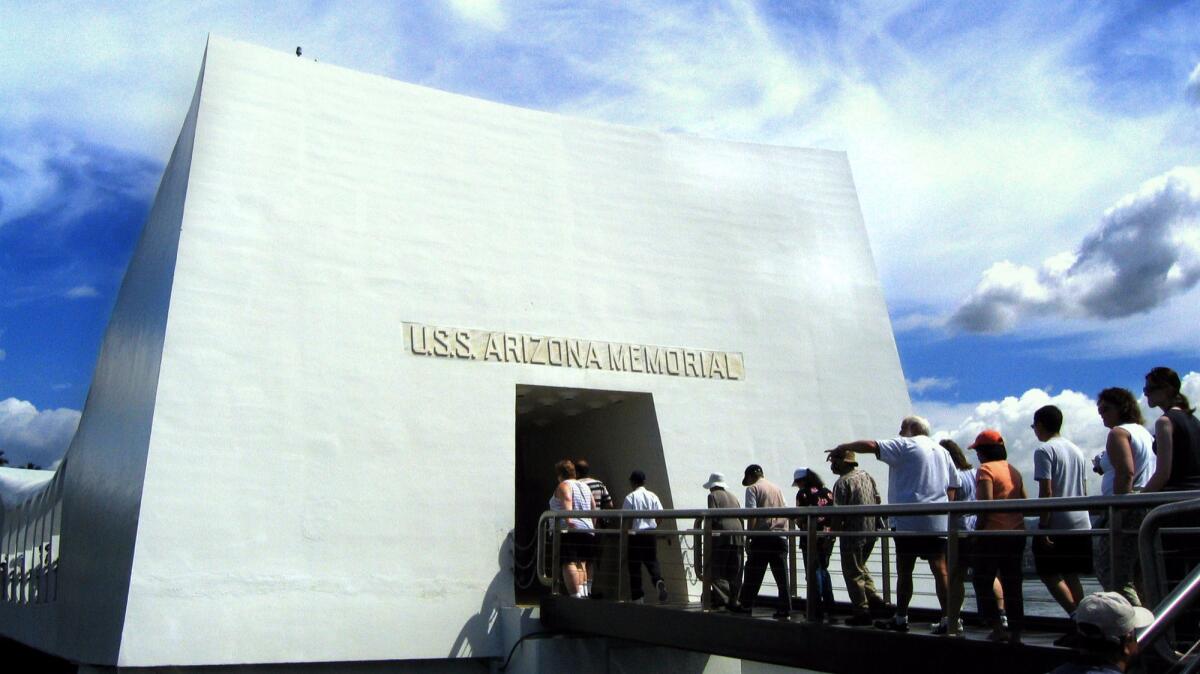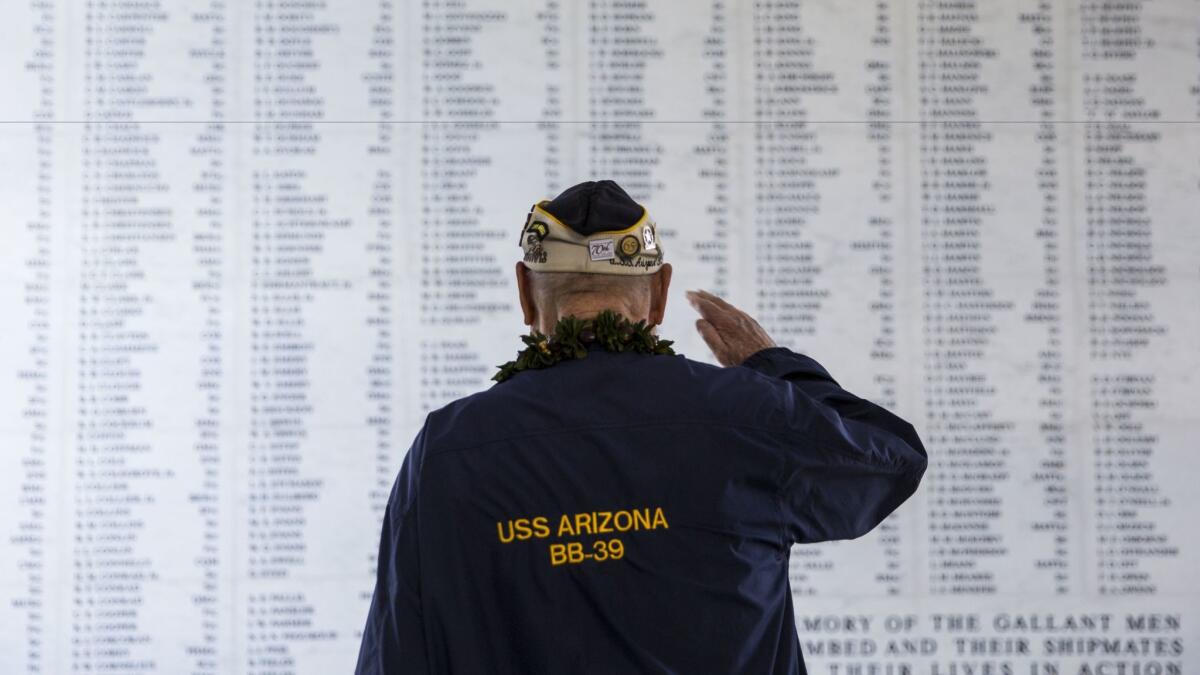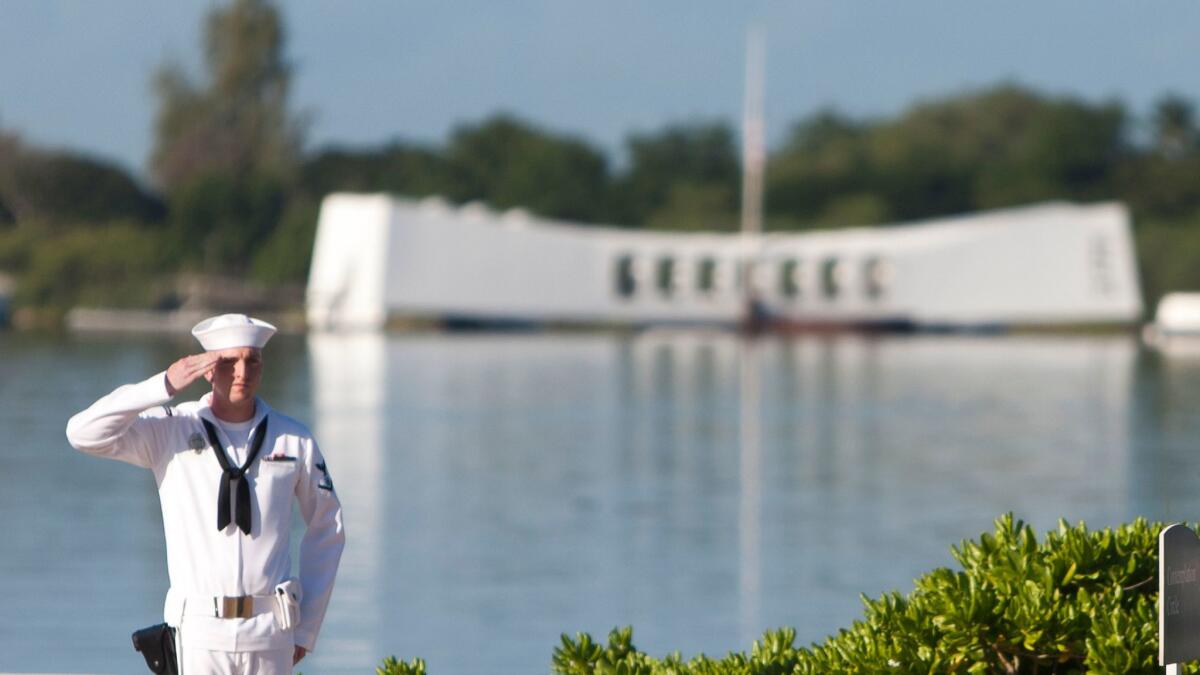At Pearl Harbor, the silence 75 years later pays tribute to the sacrifices that saved the world

Reporting from Pearl Harbor, Hawaii — Sometimes, sorrow and reverence only whisper.
As the Navy shuttle pulled near the sunken USS Arizona battleship at Pearl Harbor, National Park Service rangers requested quiet on that May day of my visit.
This landmark of American tragedy and resilience marks its 75th milestone on Wednesday.
The USS Arizona is the centerpiece of Hawaii’s part of the WWII Valor in the Pacific National Monument, which has an encyclopedic story to tell: the world before Dec. 7, 1941, and the world after.
The monument brings to life the attack on Oahu through film, artifacts, eyewitness histories and the legendary ships.
Some of the fleet float tall in the water, including “Mighty Mo,” the battleship Missouri. Others seem poised to dive, such as the USS Bowfin submarine.
And one stands mute like the military grave it is. More than 900 are entombed in the USS Arizona.
The numbers tell the story, and they are staggering: More than 2,390 Americans, including 49 civilians, were killed in the Japanese attack on Pearl Harbor on Dec. 7, 1941.
For many, the keystone of the monument is the crumpled Arizona, 40 feet down just off Ford Island.
The attack began just after 7:45 a.m. Fifteen minutes later, a Japanese bomber dropped a 1,760-pound naval projectile on the Arizona’s forward deck.
The explosion ignited aviation fuel and powder magazines, instantly killing 1,177 sailors and Marines. Of the crew of 1,511, 334 survived.

Honoring the dead
One hundred and fifty visitors, ready to pay their respects, left the Honolulu sunshine and entered the Pearl Harbor Memorial Theater.
Here, the 23-minute documentary put the prelude to war in context.
In the late 1930s, the Japanese expanded into east Asia as tensions simmered between the U.S. and the Land of the Rising Sun.
In September 1940, Japan signed the Tripartite Pact with Germany and Italy, creating the Axis powers that would battle the U.S. and its allies in World War II.
After the attack, Roosevelt branded Dec. 7, 1941, a “date which will live in infamy,” and the U.S. was at war.
‘Black tears’
After the film, we took the shuttle to the Arizona. The sun was still blazing, this time off the white memorial, perched above the ruined battleship.
A half-million gallons of oil remain trapped in the stern of the vessel. Droplets still leak into the harbor about every 20 seconds or so. Some call them “black tears.”
We stepped into the memorial’s long entry room, then through to the assembly room, where openings allow in the Hawaiian breezes and a view out to the wreckage breaking the water line.

Visitors, some bearing flowers, headed to the Shrine Room at the far end of the memorial where the names of the lost crew members are inscribed on the great marble wall.
A smaller marble wall commemorates the survivors of the Arizona blast who have chosen to be interred with their shipmates.
A display board discusses the interment of survivors who have rejoined their crew mates.
One young boy read the story on the board, illustrated with images of park service divers who place the cremation urns inside gun turret No. 4, which took the first bomb that hit the vessel.
RELATED: Our national parks can also be reminders of America’s history of race and civil rights »
The second bomb found the store of fuel and powder, igniting the explosion and fire that burned for two days.
An older boy — maybe a brother — wandered over to read too. Soon a woman — perhaps their mother — joined them. They whispered together.
The silence resonated with me.
As I boarded the Navy boat for the return, I felt relief after this, my second visit to the Arizona. I had been dreading this afternoon for weeks.
In the 1990s, as a friend and I rode the shuttle to the ship, the pilot slowed the craft so several Japanese visitors could float floral wreaths in the water. All was quiet until some passengers grumbled, none too softly, that the Japanese had no business being here.
A somber moment soon turned tense.
On this day, though, I was grateful for the quiet reflection born of a collective spirit.
A tri-state monument
The memorials at Pearl Harbor, 24 miles west of Honolulu, have been evolving for nearly 60 years.
President Eisenhower approved creation of the USS Arizona Memorial in 1958 to commemorate military personnel killed in the Pearl Harbor attack.
The memorial, constructed over the hull of the sunken ship, was dedicated in 1962. The Navy managed visitation until 1980, when operations were turned over to the National Park Service.
It is part of the larger World War II Valor in the Pacific National Monument, created in 2008, which tells stories in three states.
♦ In Hawaii, the site includes the Arizona, the USS Utah, whose hull is visible and honors 58 dead; and the USS Oklahoma, which commemorates 429 sailors who died when the ship capsized.
♦ In Alaska, the monument includes sites in the state’s Aleutian Islands, near the northern limit of Imperial Japan’s expansion in the Pacific.
♦ In California, Tule Lake explores the incarceration and segregation of U.S. citizens of Japanese descent and resident aliens of Japanese ancestry. Read more on Tule Lake >>
If you go
From LAX, United, Delta, Virgin America, Hawaiian and American offer nonstop service to Honolulu, and United, Hawaiian and Alaska offer connecting service (change of planes). Restricted round-trip fares begin at $600, including all taxes and fees.
For the Arizona visit, the National Park Service distributes 1,300 free walk-in tickets daily on a first come, first-served basis. Each is timed. Doors to the visitor center for tickets open at 7 a.m. Tickets up to two months in advance are available through www.recreation.gov.
No bags larger than the size of your hand are allowed.
The visit lasts 75 minutes, including the documentary film and a short boat ride to and from the memorial.
The 75th commemoration of the Pearl Harbor attack will run through Dec. 11, including the National Pearl Harbor Remembrance Day Commemoration, 7:45 a.m. to 9:15 a.m. on Wednesday. The public is invited. A live stream of the ceremony will run from 7 to 9:30 a.m. in the Pearl Harbor Visitor Center theaters and online.
To see all of the activities surround the anniversary, go to Pearl Harbor 75th Anniversary, pearlharbor75thanniversary.com/home
Sign up for The Wild
We’ll help you find the best places to hike, bike and run, as well as the perfect silent spots for meditation and yoga.
You may occasionally receive promotional content from the Los Angeles Times.



